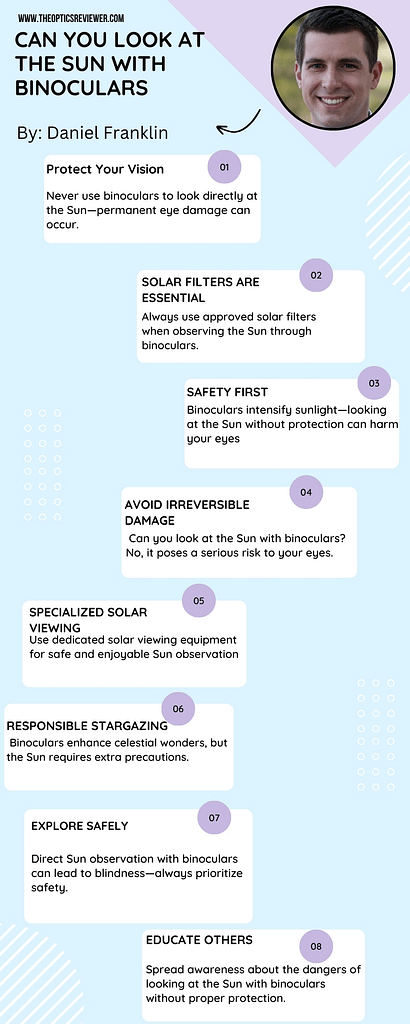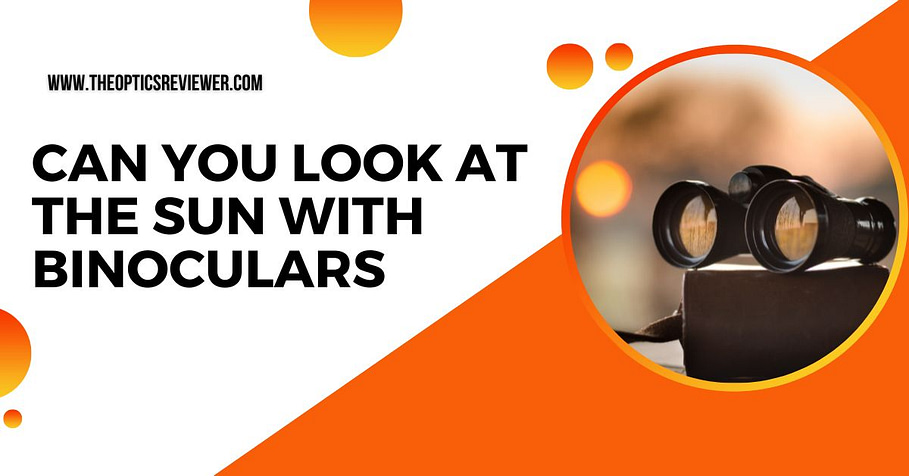Embarking on a celestial journey with binoculars sparks wonder and curiosity, but the question looms: Can you look at the Sun with binoculars? In the vast tapestry of the universe, the Sun stands as a blazing celestial beacon, captivating astronomers and stargazers alike. While binoculars unveil the moon’s craters and distant galaxies, caution envelopes the Sun’s observation.
Join us as we delve into the delicate dance between astronomy and safety. Uncover the secrets of solar observation, exploring the do’s and don’ts when peering into the brilliance of our life-giving star. From understanding solar filters to the allure of sunspots, we unravel the celestial spectacle while emphasizing the paramount importance of protective measures. Embolden your astronomical pursuits, but let’s ensure that the thrill of stargazing never eclipses the importance of safeguarding our vision.
Contents
- 1 Key Takeaways
- 2 Can You Look At the Sun With Binoculars?
- 3 What Happens To The Eyes When Looking At The Sun With Binoculars?
- 4 What are the Recommended Binoculars For Observing the Sun?
- 5 Are There Any Exceptions That Allow You To Look At the Sun With Binoculars?
- 6 What are the Common Misconceptions About Looking at the Sun with Binoculars?
- 7 What are the Signs That You Have Damaged Your Eyes From Looking At the Sun Through Binoculars?
- 8 Conclusion
- 9 References
- 10 Frequently Asked Questions
- 10.1 Can You Use Regular Sunglasses to Protect Your Eyes When Looking at the Sun With Binoculars?
- 10.2 Is It Safe to Look at the Sun Through a Camera Lens Attached to Binoculars?
- 10.3 Are There Any Special Filters or Lenses That Can Be Added to Binoculars for Safe Solar Observation?
- 10.4 Can Children Safely Look at the Sun Through Binoculars With Adult Supervision?
- 10.5 Are There Specific Times of Day or Weather Conditions That Make It Safer to Observe the Sun With Binoculars?
Key Takeaways
- Directly looking at the sun with binoculars is dangerous and can cause irreversible eye damage.
- Use specialized solar filters or solar-viewing glasses for safe sun observation.
- Binoculars alone do not provide sufficient eye protection; proper precautions are crucial.
- Seek immediate medical advice if experiencing symptoms of eye damage after sun observation.
Can You Look At the Sun With Binoculars?
Looking at the sun with binoculars can pose serious risks to your eyes and vision. The intense light from the sun, when magnified through binoculars, can cause irreparable damage to the retina, leading to conditions like solar retinopathy.
- Safety Concerns: Directly viewing the sun, even for a brief moment, without proper solar filters or solar viewing equipment, can result in permanent eye damage. Binoculars, with their increased magnification, concentrate sunlight and heat, intensifying the potential harm to your eyes.
- Solar Filters and Viewing Techniques: If you wish to observe the sun using binoculars, it is imperative to use specialized solar filters designed for astronomical viewing. Solar filters are mounted on the objective lenses of the binoculars, ensuring that harmful solar radiation is adequately blocked.
- Never Use Improvised Filters: It’s crucial to avoid makeshift filters or home remedies like sunglasses, CDs, or smoked glass. These materials do not provide sufficient protection against the intense sunlight and can lead to severe eye injuries.
- Safe Solar Observing: If you have a specific interest in solar observing, consider using dedicated solar-viewing binoculars equipped with built-in solar filters. These are designed to safely observe the sun’s surface features without risking eye damage

What Happens To The Eyes When Looking At The Sun With Binoculars?
Directly exposing the eyes to the intense light and heat of the sun through binoculars can lead to severe and irreversible damage to the delicate structures of the eye. The following consequences may occur when looking at the sun with binoculars:
- Eye damage: The high intensity of sunlight can cause damage to the cornea, lens, and other parts of the eye.
- Sun exposure: Prolonged exposure to the sun’s rays through binoculars can increase the risk of eye conditions such as cataracts and macular degeneration.
- Vision loss: Viewing the sun through binoculars can result in temporary or permanent vision loss due to the intense light damaging the sensitive cells in the retina.
- Retinal damage: The sun’s powerful rays can cause irreversible damage to the retina, leading to vision impairment.
- Solar observation: Proper precautions such as solar filters or dedicated solar viewing equipment should always be used when observing the sun to prevent eye injuries and safeguard vision.

What are the Recommended Binoculars For Observing the Sun?
When considering observing the sun with binoculars, it is crucial to select specialized solar binoculars equipped with appropriate solar filters to ensure safe viewing practices. Solar filters are essential as they block harmful ultraviolet and infrared radiation, protecting the eyes from damage. When choosing binoculars for observing the sun, opt for models with high-quality solar filters that meet industry standards.
In addition to solar filters, the magnification power of binoculars is an important factor to consider. Higher magnification allows for detailed observations, making it easier to see sunspots, solar flares, and other solar phenomena. Binoculars with magnifications between 8x and 12x are generally recommended for solar viewing.
Specialized solar binoculars are particularly useful for observing sunspots, which are dark areas on the sun’s surface indicating intense magnetic activity. They also provide a unique viewing experience during solar eclipses, allowing observers to witness the moon passing in front of the sun. Moreover, solar binoculars enable safe viewing of solar flares, which are sudden bursts of energy on the sun’s surface.
If interested you can read more about what is field of view in binoculars.
Are There Any Exceptions That Allow You To Look At the Sun With Binoculars?
Exceptionally, under specific circumstances and with the use of approved solar filters, it may be permissible to observe the sun with binoculars. Solar filters are crucial as they protect the eyes from harmful solar radiation. By following proper technique and using specialized solar filters, individuals can safely enjoy solar astronomy using binoculars. There are exceptions to the rule of never looking directly at the sun, such as during solar eclipses when the moon partially covers the sun, or when observing solar flares under strict precautions.
- Solar filters are essential for eye protection.
- Proper technique ensures safe solar observation.
- Solar eclipses provide unique opportunities for sun observation.
- Solar flares can be observed with caution and proper equipment.
- Solar astronomy allows for studying the sun’s features and phenomena.
If interested you can read more about can you bring binoculars to sofi stadium.
What are the Common Misconceptions About Looking at the Sun with Binoculars?
Common misconceptions about looking at the sun with binoculars often revolve around assumptions of sufficient eye protection from the lenses, the idea that cloud cover offers adequate safety, the belief that short glances pose no risk, and the misconception that sunglasses provide ample protection. Addressing these misconceptions is crucial to prevent potential eye damage and ensure a correct understanding of the dangers associated with observing the sun through binoculars. Clarifying these points is essential for promoting safe practices when engaging in solar observation activities.
| Misconceptions | Reality |
|---|---|
| Cloud cover is enough | Direct sunlight can still harm your eyes |
| Sunglasses offer safety | Sunglasses do not provide adequate protection |
| Brief glances are fine | Even short exposures can cause eye damage |
| Binoculars are enough | Specialized solar filters are necessary |
| Staring is harmless | Prolonged viewing can lead to permanent eye damage |
Binoculars Provide Sufficient Eye Protection
What misconceptions are commonly associated with looking at the sun through binoculars for eye protection? One common misconception is that binoculars alone can provide sufficient protection for viewing the sun, which is not true. To clarify, here are some key points to consider:
- Solar filters: Binoculars need to be equipped with specialized solar filters for safe sun observation.
- Safety precautions: Even with filters, additional eye protection such as eclipse glasses is essential.
- Sunspot observation: Binoculars can enhance sunspot visibility, but proper precautions are crucial.
- Optical alignment: Improper alignment of binoculars can lead to increased eye exposure to harmful solar rays.
- Solar eclipse viewing: Specialized filters are a must for safely observing solar eclipses through binoculars.
Cloud Cover Provides Adequate Protection
When considering the protection needed for viewing the sun through binoculars, it is crucial to dispel the misconception that cloud cover alone provides adequate safety measures. While clouds can reduce the intensity of the sunlight, they do not offer sufficient protection for safe solar observation. Direct sunlight can still penetrate through thin cloud layers, putting the eyes at risk of damage.
It is essential to use proper solar filters or specialized equipment designed for sun observation when using binoculars to view the sun.
Short Glances Are Harmless
It is imperative to understand that assuming short glances at the sun through binoculars are harmless can lead to serious eye damage due to the intense solar radiation exposure. The common misconceptions about looking at the sun with binoculars include risks such as:
- Solar flares: Sudden bursts of energy from the sun.
- Retinal damage: Permanent harm to the light-sensitive layer of the eye.
- Corneal burns: Injuries to the eye’s outermost layer.
- UV radiation: Harmful ultraviolet rays that can cause various eye conditions.
- Sunspot activity: Dark spots on the sun linked to intense magnetic activity.
Always prioritize eye safety and avoid looking directly at the sun, even for short periods.
If interested you can read more about Are Binoculars Allowed on Airplanes.
Sunglasses Offer Sufficient Protection
Considering the potential risks associated with solar radiation exposure when looking at the sun through binoculars, the misconception that sunglasses offer sufficient protection must be addressed to prevent serious eye damage. Sunglasses, while providing some protection from visible light and glare, often lack the necessary features to shield against harmful UV rays.
Proper eye protection when viewing the sun requires specialized lenses with adequate UV protection, such as those specifically designed for solar observation. Polarized lenses can reduce glare but do not necessarily offer full UV defense. Sun damage is a real concern for eye health, and relying solely on sunglasses can lead to long-term consequences. Therefore, investing in high-quality lenses designed for solar viewing is crucial to safeguarding your eyes from potential harm.
What are the Signs That You Have Damaged Your Eyes From Looking At the Sun Through Binoculars?
If one has looked at the sun through binoculars, signs of eye damage may manifest as symptoms such as a headache, photosensitivity, eye-watering, and sore eyes. These symptoms could indicate mild solar or photic retinopathy due to sun exposure. However, more severe solar retinopathy may present with additional alarming signs like blind spots in the center of your vision, blurred or distorted vision, difficulty perceiving colors, and challenges in recognizing shapes.
In case you have engaged in such risky behavior, seeking immediate medical advice is crucial to assess the extent of the damage. Remember, even a brief exposure of 1 or 2 seconds to the sun through binoculars can have harmful effects on your eyes. Therefore, it is essential to prioritize your eye health and consult with a healthcare professional promptly if you experience any of these vision symptoms.
- A headache
- Photosensitivity (discomfort when looking at light)
- Eye-watering
- Sore eyes
- Blurred vision or distorted vision
Conclusion
In conclusion, while binoculars are excellent tools for observing various celestial wonders, it’s crucial to emphasize that whenever it comes to Can you look at the Sun with binoculars? The answer remains a firm and imperative No. The Sun’s intense brightness can cause irreparable damage to your eyes, even with optical aids.
Always prioritize safety and use specialized solar filters or dedicated solar viewing equipment when exploring the wonders of our closest star. Embrace the fascination of the cosmos responsibly and protect your vision for continued celestial enjoyment.
References
- https://www.sciencedirect.com/science/article/pii/004269899500082P
- https://www.sciencedirect.com/science/article/pii/004269899500082P
- https://link.springer.com/article/10.1007/BF00248221
- https://link.springer.com/article/10.1007/BF01203381
Frequently Asked Questions
Can You Use Regular Sunglasses to Protect Your Eyes When Looking at the Sun With Binoculars?
When engaging in solar viewing with binoculars, regular sunglasses are insufficient for eye protection. Specialized solar eyewear, designed to block harmful UV and infrared light, is essential to prevent sun damage and ensure safety. Protective gear is imperative for solar observation.
Is It Safe to Look at the Sun Through a Camera Lens Attached to Binoculars?
Observing the sun through a camera lens attached to binoculars presents risks of eye damage due to intense solar radiation. This method is not recommended for viewing solar phenomena like eclipses, sunspots, flares, or for solar photography typically done in observatories.
Are There Any Special Filters or Lenses That Can Be Added to Binoculars for Safe Solar Observation?
For safe solar observation through binoculars, specialized solar filters can be added to the lenses. Protective eyewear is essential. Binocular attachments designed for solar viewing are available to ensure proper filtering of harmful sun rays.
Can Children Safely Look at the Sun Through Binoculars With Adult Supervision?
When it comes to solar viewing, child supervision is crucial. Ensuring sun safety and eye protection is paramount. With proper adult guidance, children can safely observe the sun through binoculars following recommended observing tips for a memorable experience.
Are There Specific Times of Day or Weather Conditions That Make It Safer to Observe the Sun With Binoculars?
Specific times of day or weather conditions can affect the safety of observing the sun with binoculars. For optimal viewing, consider using solar filters, especially during a solar eclipse, sunspots observation, or solar flares visibility. Solar telescopes offer enhanced protection.

